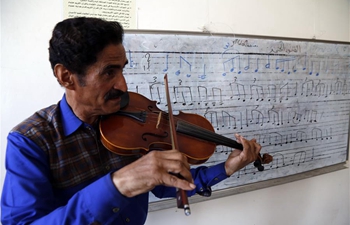by Levi J Parsons
SYDNEY, July 25 (Xinhua) -- Although the overwhelming majority of Chinese residents living in the Australian community of Sunnybank speak English, in times of crisis or panic, it's only natural to revert back to their native tongue.
That's why police officers in Southeast Queensland state community decided to start learning mandarin.
"There's a giant Chinese influence in Sunnybank and having interacted with a lot of people here as a police officer, it's often hard to communicate when they've been involved in a traumatic incident," Queensland Police Acting Senior Sergeant Michael Morier explained to Xinhua. "So that can make it hard for us to get vital information when we arrive on scene."
Although Queensland Police do have access to Chinese language translators, finding them on short notice can often be difficult.
"Sometimes we would use our iPads and apps like Google Translate, but often it doesn't work and a lot of important things would get lost in translation," Morier said.
"So I thought there had to be a better way of doing things."
Seeking help from Griffith University and the Tourism Confucius Institute, the first 12 officers signed up to a groundbreaking new language program in May 2018, which was the first of its kind for any law enforcement agency anywhere in Australia.
"I'd never thought that Australian police would like to learn mandarin until Senior Sergeant Michael Morier approached us and showed great interest and passion in studying mandarin," their teacher Wu Shuang from the Tourism Confucius Institute at Griffith University told Xinhua.
"Teaching police officers mandarin is also a new experience as well as a challenge for me too."
"But with a strong willingness to better help local Chinese communities, all the police officers in the class have been very self-motivated and self-disciplined."
While the group began with some basic greetings and polite phrases, because of their work the officers required something a little bit more specialized than the typical language courses on offer.
Instead of learning how to book a hotel room, order a meal or pay for a taxi, Wu went about customizing the course to better suit their unique needs.
"For example, some of the police officers oversee traffic, so I put a topic on traffic in the course including how to say, 'do you have a Queensland driver license?' 'Is this your car?' 'You are not permitted to park here' and things like that," Wu said.
Because some officers in the group are also detectives, Wu even added a topic on murder investigations to her teaching materials.
"So far, we have had five terms during which we kept receiving new officers to join in," she said.
"They all study at a different pace but all of them are sparing no effort to learn about Mandarin and Chinese culture. I feel so proud of them and I'm so glad that I could help."
While it is still early days and the officers say they have a long way to go before they're fluent in the language, one officer has already become an online star in China after videos of him interacting with Chinese residents went viral across a range of social media platforms.
"I walk around in Sunnybank now and people say 'oh that's the guy!' Queensland Police Senior Constable Jason Davie told Xinhua.
"A guy who I unfortunately had to give a ticket to the other day, we ended up having a good chat and he was actually very happy."
"He recognized me straight away from the WeChat videos getting around."
"When someone thanks you after they receive a ticket, it's certainly unusual," he laughed.
Beginning with a few simple greetings when he stopped drivers for routine traffic stops, Davie said, "it took a bit of guts at first because you know how bad you probably sound."
"The fact that the grammar is very different to English and that you have to learn the tones alongside the actual words, so you're not only having to remember what words to say, but also how to say them, that's very different to English so I imagine I sound very robotic."
After building up his confidence, Davie then began to add more and more phrases to his repertoire.
"I'm getting all right now, so people can actually understand what I'm saying which is good," he said.
"They're often a bit surprised. So much so that people want to film me on their phones sometimes."
With the success of the initiative, talks are already underway to expand the program to officers working on the Gold Coast, where over 300,000 Chinese visitors travel to every year.
"My advice to all those who are interested in learning mandarin is do it!" Wu said.
"Mandarin is gaining popularity and importance in many industries so don't let language be a barrier between you and your Chinese counterparts."
"Instead, break the ice and put a smile on everyone's face with a simple, 'ni hao, hen gaoxing renshi ni!' (Hello, nice to meet you)"












